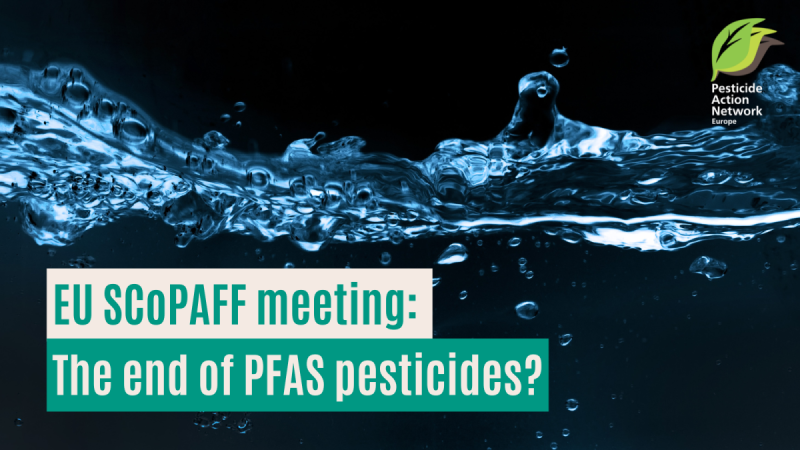The future of two PFAS pesticides will be decided in a March 11-12 meeting between the EU Member States and the European Commission. The substances are flufenacet, an endocrine disruptor, and flutolanil. Both emit the very persistent TFA into the environment. Officials will also vote on a worrisome proposal to renew a reprotoxic “cut-off” substance pretending that it won’t lead to contact with humans.
The meeting of the Standing Committee of Plant, Animals, Food and Feed (ScoPAFF) will discuss the fate of several harmful pesticides, including two PFAS pesticides. Despite their shared ability to generate the water pollutant trifluoroacetic acid (TFA), an ultra short chain PFAS, only flufenacet’s ban will be put to the vote. Discussions on flutolanil stall due to lack of sufficient support from Member States. Fifty Members of the European Parliament called on the Commission and Member States to take urgent action and ban all PFAS pesticides. [1]
PFAS Pesticides: both flufenacet and flutolanil must go
Flufenacet and flutolanil meet the OECD definition of per- and polyfluoroalkyl substances (PFAS), so-called ‘forever chemicals’. Both degrade into TFA, a mobile and highly persistent PFAS contaminant that has been detected in groundwater at alarming levels. While TFA pollution from different sources is growing across Europe, the German Chemical Agency proposed to the EU regulators to classify it as harming prenatal development. PFAS pesticides are a substantial source of TFA into water resources, according to the German Environment Agency (UBA) [2] and scientific findings [3].
PAN Europe showed strong support for the European Commission’s proposal for non-renewal of both substances. While flufenacet is expected to be banned due to its identification as an endocrine disruptor, which is a ‘cut-off’ criterion under the EU Pesticide law, the decision on flutolanil remains under discussion. At the last ScoPAFF meeting in December, only 12 Member States supported banning flutolanil, while two were explicitly opposed, and the rest had no position. [4] This slow decisionmaking process is leading the Commission to propose extending the current approval of both substances with another year on the European market, while waiting for a final decision to ban them.
Endocrine Disruptors: fenoxaprop-P-ethyl and fludioxonil
EFSA identified two new substances as endocrine disruptors, disturbing the normal functioning of the human hormonal system. Fludioxonil was found to induce delayed sexual maturation while fenoxaprop-P-ethyl alters organ weight. According to these findings, the two substances meet the ‘cut-off’ criterion for endocrine disruption of the EU Pesticide Law: they were found to cause harmful effects on human health.
Both substances should have been banned in 2018, but their approvals were repeatedly extended. In fact, the Commission is proposing to prolong the approval of fludioxonil one more time until 30 December 2026 “for the Commission to adopt the ensuing risk management decisions”. [5] This proposal is unacceptable considering the clear evidence that the substance does not meet the requirements to be renewed. Moreover, fludioxonil was the most often detected candidate for substitution in European fruit between 2009 and 2019 according to data from the EU Multiannual Control Programme analysed by PAN Europe. [6]
Without further prolongation or delay and in line with the EU Pesticide Law, these two substances should be banned. This call by PAN Europe [7] was echoed by the EDC Free Europe coalition, a coalition representing more than 70 public interest groups, who share a concern about endocrine-disrupting chemicals (EDCs) and their impact on our health and wildlife. [8]
8-hydroxyquinoline (quinolin-8-ol)
The European Commission is pushing forward with its proposal to renew the approval of 8-hydroxyquinoline, a pesticide classified as reprotoxic. This substance is part of PAN Europe’s Toxic 12 list of pesticides that should be banned immediately. [9]
The Commission is using a derogation of the EU Pesticide Law to renew this substance, which meets a “cut-off” criterion which should normally lead to its ban. The Pesticide Regulation clearly establishes that reprotoxic substances cannot be approved in the EU, unless negligible exposure to humans can be demonstrated.
This exemption must be interpreted restrictively to ensure high protection standards. This means negligible exposure must be demonstrated for all exposure groups (workers, operators, residents and bystanders) through an objective, robust, and comprehensive dataset. These conditions have not been met for quinolin-8-ol due to a lack of reliable data. [10]
Also of concern is the absence of harmonised guidance on what constitutes "negligible exposure." It is therefore unclear and concerning on what methodological basis EFSA, and in the future Member States issuing authorisations, can conclude that negligible exposure is achieved.
Work on the guidance document on negligible exposure is ongoing and we submitted our comments. [11]. This guidance document gives rise to major divergences of views and has not yet been adopted by the Member States. We strongly oppose the use of a vague concept to undermine EU pesticide law.
About the Committee meeting:
Notes:
[1] Call by 50 MEPs to ban all PFAS pesticides
[3] Joerss H, Freeling F et al. Pesticides can be a substantial source of trifluoroacetate (TFA) to water resources. Environ Int. 2024 Nov;193:109061. doi: https://doi.org/10.1016/j.envint.2024.109061
[7] Call to propose the non-renewal of fenoxaprop-P-ethyl and fludioxonil
[9] Ban Toxic 12
[10] 'Don’t worry, you will not be exposed to this very harmful pesticide'
[11] Strengthening EU Guidance on negligible exposure to pesticides
